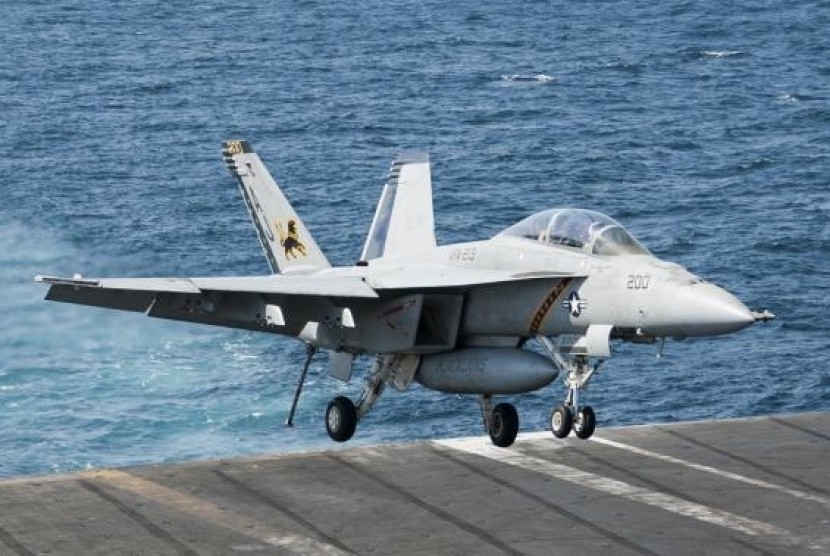REPUBLIKA.CO.ID, US warplanes pounded Islamic State fighters in Syria and Iraq for a second day on Wednesday as President Barack Obama tried to rally support for the coalition fighting the extremist group during an address to the UN General Assembly in New York.
US Central Command said Bahrain, Jordan, Saudi Arabia, the United Arab Emirates and Qatar had participated in or supported strikes against Islamic State targets during the opening day of the campaign on Tuesday.
Below is a summary of where key countries stand on joining the United States in a military coalition to fight Islamic State:
FRANCE
France carried out its first air strike in Iraq on Sept. 19, targeting an Islamic State logistics depot near Mosul. It has since carried out reconnaissance missions and supported Iraqi ground troops near Baghdad, although it has not re-engaged. French special forces are already training Kurdish Peshmerga forces in the north after providing weapons to the Kurds.
France continues to rule out air strikes in Syria, fearing that it could change the balance of power on the ground in favour of President Bashar al-Assad, who Paris says is as much of a problem as Islamic State.
AUSTRALIA
Australia has decided to send eight F-18 Super Hornet fighter jets to assist in the US-led air campaign against Islamic State fighters in Iraq. Australia also has agreed to send special forces troops to act as advisers to Iraqi forces.
BRITAIN
British Prime Minister David Cameron has asked for Parliament to be recalled so it can vote on Friday on whether to join the US-led air strikes against Islamic State. The move came after Iraq asked Britain to support coalition operations against the group.
Britain already has delivered aid and weapons to Kurds in Iraq and promised them training. Britain has said any strikes in Syria would be more complicated because they could not be carried out in cooperation with Assad's government.
BELGIUM
Brussels is inclined to contribute to coalition efforts against Islamic State and officials say they have the military capacity to do so. Belgium has been contributing humanitarian assistance. But with jihadists from the Belgium joining Islamic State, Belgian officials say it is in their interest to participate in coalition efforts to halt its spread.
NETHERLANDS
The Dutch government said on Wednesday it would deploy six F-16 fighters and as many as 380 military personnel to support the US-led fight against Islamic State insurgents in Iraq. Deputy Prime Minister Lodewijk Asscher told reporters the planes would be used to target Islamist militants in Iraq and the personnel would provide training and advice to Iraqi and Kurdish regional military forces for up to one year.
TURKEY
Turkey, a NATO member and close US ally that borders both Iraq and Syria, had initially ruled out taking part in the military effort against Islamic State, but President Tayyip Erdogan indicated a shift in position on Tuesday, saying Ankara would provide military or logistical support.
The change came after IS fighters freed 46 Turkish nationals who were held hostage. Turkey has felt a direct impact as a result of Islamic State's ruthless assaults in Syria. More than 130,000 Syrian Kurds have surged across its border in the past week, fleeing an IS advance on the town of Kobani.
ARAB COUNTRIES
The West deems Arab participation in the fight against Islamic State crucial to counter accusations that it is pursuing a new Western crusade against Islam in the Middle East.
Saudi Arabia, the United Arab Emirates, Jordan and Bahrain all took part in Monday night's air strikes, while Qatar played a supporting role, the US official said. Saudi Arabia had already agreed to host US training of "moderate" Syrian opposition fighters.
Lebanon has joined the coalition politically. Foreign Minister Gebran Bassil says Beirut already is in a fight with Islamic State extremists on its own territory and is seeking military equipment from foreign countries to help it repel them.
RUSSIA
President Vladimir Putin told UN Secretary General Ban Ki-moon on Monday that air strikes on Islamic State bases inside Syria "should not be carried out without the agreement of the government of Syria." The Russian Foreign Ministry said this meant securing explicit consent, rather than merely notifying Damascus.


